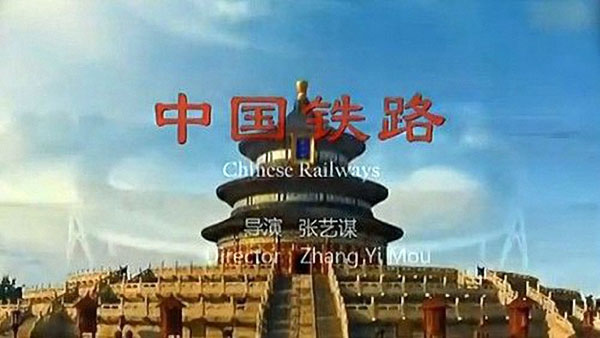
A promotional video for the Ministry of Railways that cost 18.5 million yuan ($2.90 million) to make has triggered a corruption investigation into a married couple who are ministry officials.
At least 7 million yuan that was invested in producing the video was alleged to have been used as illegal kickbacks, the Beijing-based newspaper Economic Information reported on Monday, citing sources from Beijing Xinshike Film and Culture Development Company — the company that produced the video.
Last month, the National Audit Office discovered that the ministry had spent 18.5 million yuan on the 5-minute video Chinese Railways without going through a public bidding process as required.
"The promotional video has failed to produce the desired effect … and we urge the ministry to further probe into the problem," the office said in an annual audit report.
 |
|
A screen shot of Chinese Railways, a promotional video made by the Ministry of Railways. Provided to China Daily |
The video was made in 2009 and 2010 to highlight the development of China's railway system, according to the report.
It was played at the 7th World Congress on High-Speed Rail in Beijing in 2010.
Zhang Yimou, a famous Chinese filmmaker and director of the 2008 Beijing Olympics opening and closing ceremonies, faced public scrutiny after he was hired by the company to direct the video.
In an interview with zhongguowangshi.com, a news website of Xinhua News Agency, Zhang said he was hired by the company to give advice on artistic style for the video. In return, he accepted 2.5 million yuan in after-tax income as remuneration.
Although the video had a credit stating "Director: Zhang Yimou", Zhang said according to the contract he signed, his name should not have been listed on the video as director.
As for the comments from netizens that it was a boring and mediocre video, Zhang said he agreed with their criticisms. The authority wanted to highlight the achievements of the railway system in the video mostly through voice-overs, instead of images and stories, Zhang said.
Zhang said he later learned through online reports that the video cost 18.5 million to produce and that there was corruption involved.
"I was very surprised. I did not know about it. And I was not in control of this," he said. "But I think I should reflect on it. When facing similar situations in future, I will do more research to gain a clearer idea. I will shoulder more social responsibilities."
Zhang vowed to cooperate with authorities to dispose of the earnings.
Authorities working on the case launched an investigation early this month into Chen Yihan, deputy secretary-general of the federation of literary and art circles of the ministry, who was the former head of the ministry's publicity department.
An insider said inspectors found more than 10 million yuan in cash and at least nine property ownership certificates in Chen's home, Caixin.com reported.
But because authorities thought that Chen, a low-ranking official, could not have obtained such a large amount of money and property, authorities began investigating her husband, Liu Ruiyang, deputy director of the ministry's vehicle department.
Investigators allegedly found bank deposit books and prepaid shopping cards in Liu's office.
An investigation into the couple is ongoing.
Calls to the railway ministry's publicity department during office hours went unanswered on Monday.
"The short promotional video is by no means worthy of that much investment, which can almost produce an exquisite movie," said Ying Xiaoqiang, creative director of an advertising company in Hangzhou.
Zhu Lijia, a professor of public policy at Beijing's Chinese Academy of Governance, said the case once again proves that a loophole exists in the government's budget restraint system.
According to a notice from General Office of the State Council in 2010, government organizations must adopt the public tender method to purchase goods or services valued at more than 1.2 million yuan.
Xin Dingding contributed to this story.
Contact the writer at [email protected]







